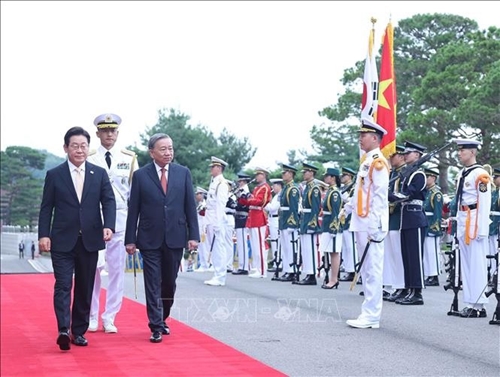Speaking to the Vietnam News Agency (VNA)'s resident correspondent in Kuala Lumpur, Collins Chong Yew Keat, Foreign Affairs, Security & Strategy Analyst at the University of Malaya, said the visit elevated the bilateral ties to a new level across all fronts.
    |
 |
|
Korean President Lee Jae Myung and Party General Secretary To Lam review the Guards-of-Honor at the welcome ceremony. |
Politically, the two countries agreed to enhance exchanges at all levels to build deeper trust and institutionalized cooperation. In security and defense, they committed to closer collaboration in defense industry, maritime security, mine clearance, peacekeeping, and counterterrorism. Economically, they set ambitious targets to boost trade and cooperate in nuclear and renewable energy, high-speed rail, finance, and science and technology.
Cooperation will also be expanded in innovation and energy, covering artificial intelligence (AI), semiconductors, biotechnology, critical minerals, digital infrastructure, and renewable energy. People-to-people exchanges are set to grow through expanded labor mobility, education scholarships, cultural programs, and tourism promotion.
According to the analyst, the outcomes of the visit go beyond the bilateral scope, carrying significant implications for ASEAN’s security and economic landscape. Stronger Vietnam–RoK ties will foster ASEAN’s external linkages, particularly in non-traditional security such as maritime safety, climate resilience, and the fight against transnational crime. Vietnam serves as a “bridge” linking the RoK to Southeast Asia, reinforcing ASEAN’s centrality in mechanisms like the East Asia Summit (EAS) and the ASEAN Defense Ministers’ Meeting Plus (ADMM+).
Both countries' reaffirmation of their support for peaceful settlement of disputes in line with the United Nations Convention on the Law of the Sea (UNCLOS) 1982 and for negotiations on a Code of Conduct in the East Sea (COC) directly supports ASEAN’s maritime security objectives. Vietnam’s balanced diplomacy also positions it as a potential facilitator in inter-Korean dialogue, indirectly contributing to regional stability.
On the economic front, the Vietnam–RoK partnership strengthens ASEAN's integration by accelerating infrastructure, energy, and digital connectivity projects, complementing regional supply chains. In the face of global trade disruptions caused by geopolitical tensions and tariff changes, deeper cooperation offers ASEAN members new avenues for investment, technology transfer, and market diversification, reducing overdependence on any single economic partner.
The analyst said the RoK's investment in Vietnam, especially in high-tech sectors, is expected to spill over to neighboring ASEAN economies, raising innovation standards and industrial capacity. Closer coordination in multilateral forums such as the EAS, APEC, and the ASEAN Regional Forum (ARF) will further help ASEAN maintain cohesion and strategic relevance.
By combining the RoK’s advanced industrial capabilities with Vietnam’s dynamic role in ASEAN, the expert noted, the visit has helped lay the groundwork for a stronger regional economy, a more resilient security architecture, and closer ASEAN–Northeast Asia linkages, shaping both bilateral and regional dynamics in the decade ahead.
Source: VNA